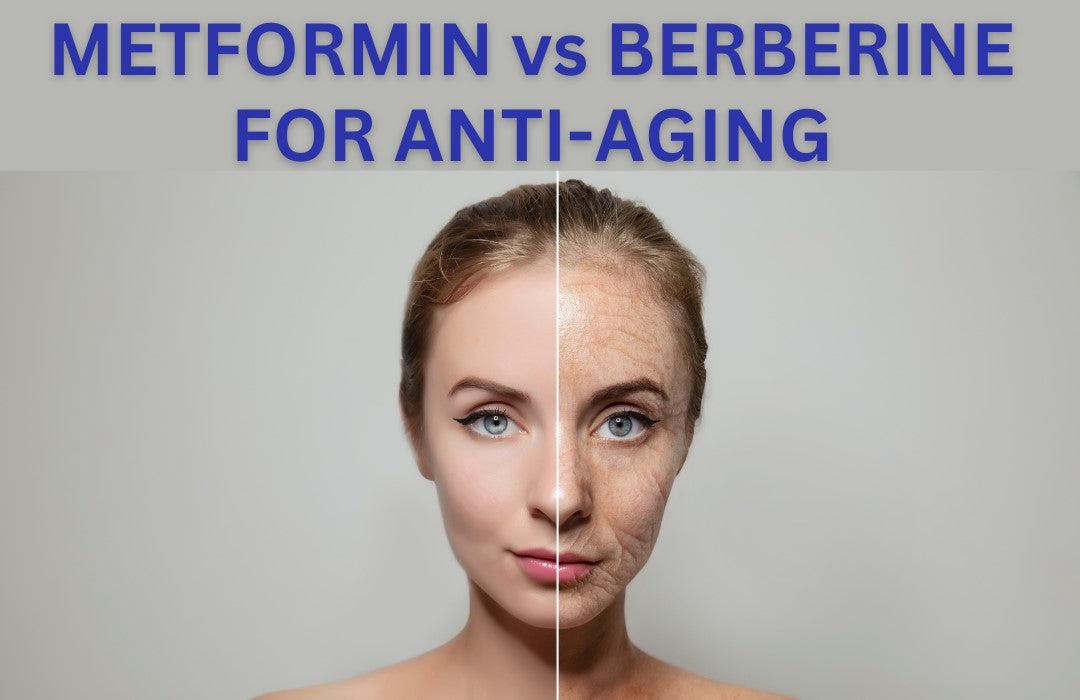
Pretty much anyone over the age of 30 has heard about the infamous Fountain of Youth, the legendary spring believed to have the power to restore youth and vitality to those who drink from it. Despite the fact that tales of the Fountain of Youth have been around for centuries, there is no historical evidence to support its claim, and it is widely believed to be nothing more than a myth.
What is not a myth, is the science surrounding the hormone insulin, and how elevated levels of this hormone are well documented to increase biological aging. As almost all hormones decline after the age of 30, only a few actually increase and insulin is one of them. Since high insulin levels are synonymus with premature aging, it stands to reason that substances – pharmaceutical or natural – that keep this hormone in check, can also impact aging in a positive manner.
A Diabetic Drug that Makes Us Younger?
Metformin is a well-known oral medication used to treat type 2 diabetes. It works by decreasing the amount of glucose produced by the liver, all the while improving insulin sensitivity in muscle and fat cells. By lowering blood sugar levels and improving insulin activity, metformin is used by millions of diabetic patients around the world. However, in recent years, there has been a growing interest in using metformin as an antiaging medication, albeit in low doses. By controlling blood sugar and insulin levels, it is postulated that metformin may potentially extend lifespan and delay the onset of age-related diseases. It's interesting to note that many type 2 diabetics who take the drug, also seem to live longer than those who don’t.
Metformin seems to work its antiaging magic by impacting a cellular pathway called AMPK (AMP-activated protein kinase) pathway. AMPK is a cellular energy sensor that plays a crucial role in regulating metabolism and promoting longevity. When activated, AMPK increases energy expenditure as well as reducing body fat. AMPK also decreases the production of glucose and fatty acids in the liver. This leads to improved insulin sensitivity, lower blood sugar levels, and reduced oxidative stress, all of which are associated with aging and age-related diseases.
Metformin activates the AMPK pathway by inhibiting an enzyme called complex 1 in the mitochondria (where energy is released within the cells). This leads to an increase in the level of AMP, which activates AMPK and triggers the above-mentioned metabolic changes.
Too Good to Be True?
While metformin seems to be a promising antiaging drug, it is still a prescription medication and comes with risks and side effects. The most commonly reported side effects include nausea, diarrhea, and abdominal discomfort. In rare cases, it can also cause a dangerous condition called lactic acidosis, which can be life-threatening. Furthermore, metformin can interact with other medications and may not be suitable for everyone, particularly those with liver or kidney problems.
Berberine A Natural Alternative
Berberine is a natural compound found in several plants, including barberry, goldenseal, and Oregon grape. It’s been used in traditional Chinese medicine for thousands of years and has been shown to have a similar mechanism of action to metformin, but without the risks and side effects.
Berberine also works by activating the AMPK pathway, leading to improved insulin sensitivity, lower blood sugar levels, and reduced oxidative stress. Aside from its antiaging effects, berberine has also been shown to have potential benefits for weight management, cardiovascular health, and reducing the risk of certain types of cancer.
How to Take Berberine for the Best Results
Berberine is available as a natural supplement, which can be taken orally. The most effective times to take berberine are 15 to 20 minutes before a meal high in carbohydrates. This is because it helps control blood sugar levels and prevent spikes in insulin levels that can occur after consuming a high-carb meal.
The recommended dosage for berberine varies depending on the individual and the specific health goal. However, a commonly used dose is 500 mg, taken two to three times per day. It is important to talk to a healthcare professional before starting a berberine supplement, especially if you have a pre-existing medical condition or are taking any other medications.
The one drawback with berberine is it is difficult to absorb, which is why it is best taken along with humic-fulvic acid complexes. Humic and fulvic acids have an incredible ability to increase the absorption and delivery of other compounds when taken at the same time. Aside from this, humic and fulvic acids deliver their own antiaging benefits, by further increasing cellular energy production while delivering 77 organically bound trace minerals to the cells.
Conclusion
While metformin has shown promising results, it also comes with risks and side effects. Berberine is a natural alternative that works in a similar way, without the risks associated with a prescription medication. By taking berberine along with a humic-fulvic acid complex 15 to 20 minutes before meals, you can positively affect the way your body deals with blood sugar and insulin levels.
References